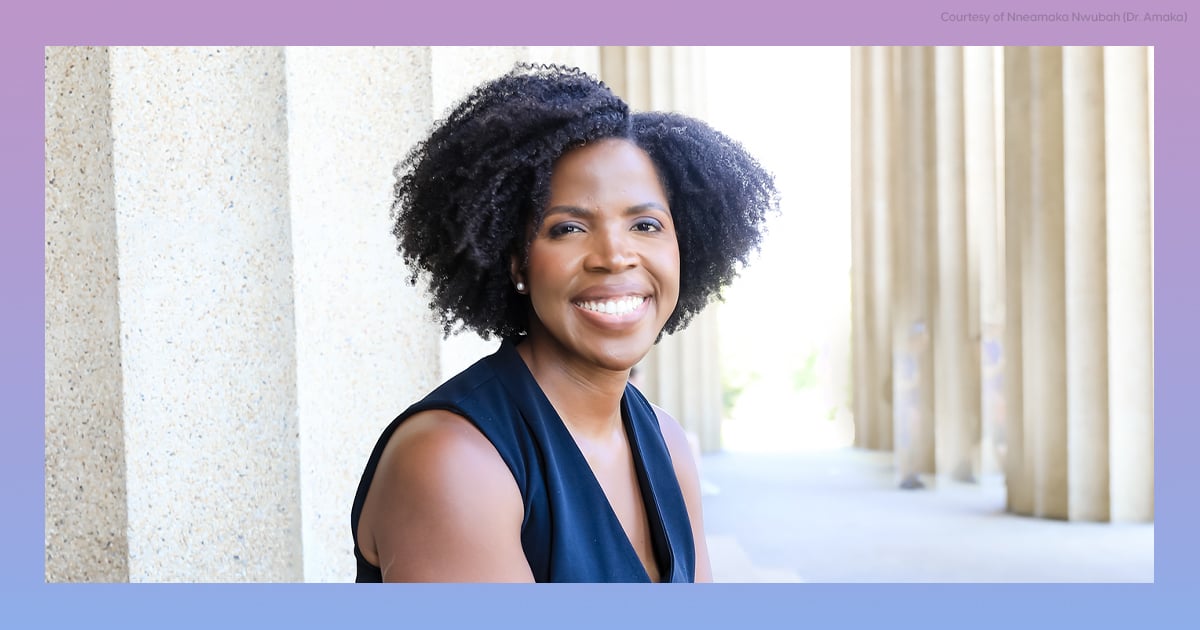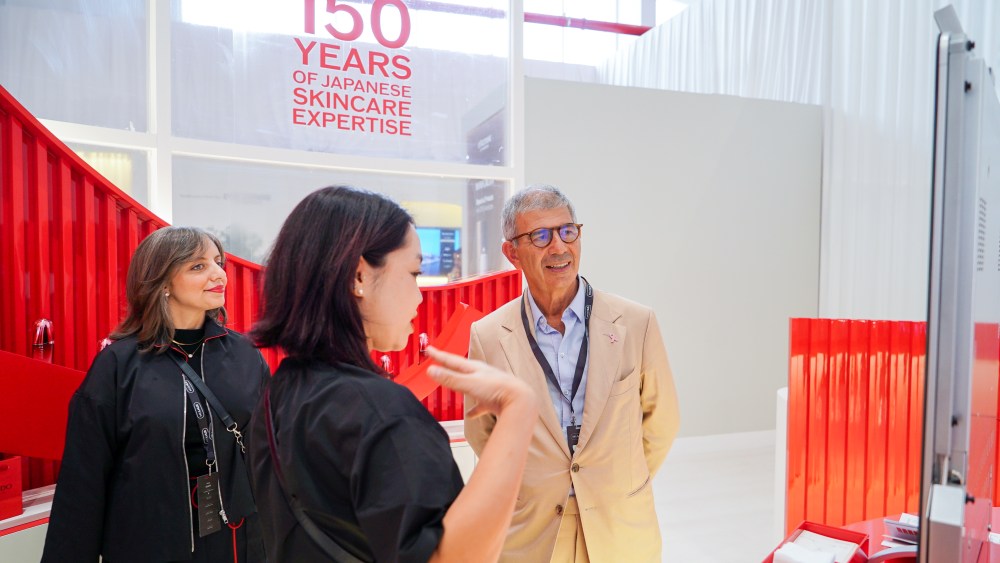There are so many aspects of health that disproportionately affect the Black community, and yet less than six percent of US doctors are Black – a deficit that only further harms public health. Many of the Black folks who work in healthcare have dedicated their careers to combatting inequities. That’s why, this Black History Month, PS is crowning our Black Health Heroes: physicians, sexologists, doulas, and more who are advocating for the Black community in their respective fields. Meet them all here.
It’s not uncommon for doctors to know from a very young age that they’re destined for medicine. That was certainly the case of Nneamaka Nwubah, MD, better known as Dr. Amaka. After experiencing hospitals and loss at a young age, the board-certified plastic and reconstructive surgeon knew she wanted to help people. She just didn’t know how, exactly, until her third year of medical school. The moment of clarity came after observing a mastectomy for breast cancer, followed by two plastic surgeons completing reconstructive surgery.
“I was like, ‘How is this even possible?'” Dr. Amaka tells POPSUGAR. “At that moment, I was like, this is what I’m doing. It was that crystal clear.”
At first, she was told it would be too hard and too competitive, and that it would be impossible to ever have a family while working in the field, but thankfully, she stayed the course. “I had to just silence all that noise and focus on the vision in my heart for it,” she says. She ended up matching in plastic surgery, just as she had dreamed, and the rest fell into place. Now she owns a private practice in Nashville and has become known as the person to go to for “mommy restoration,” which is her preferred name for “mommy makeovers,” or customizable procedures that address physical changes that can occur during pregnancy, childbirth, and breastfeeding. Not to mention, she has more than 231,000 followers on TikTok, where she regularly shares informative videos demystifying the world of aesthetics.
We spoke to Dr. Amaka about her career evolution, how “mommy restoration” surgeries accidentally became her signature, and the importance of representation in the industry – not just on the professional side, but on the patient side as well.
POPSUGAR: Tell us how you started in the plastic surgery and aesthetics field.
Dr. Amaka: After residency, I realized I liked aesthetics and cosmetics. So I did a one-year fellowship focusing on the aesthetic aspect of plastic surgery, the refinement; all of the cosmetic aspects of it. We get a ton of reconstructive stuff in residency, but we don’t get a ton of aesthetics, and I just knew I wanted to start out at the top of my game. I didn’t want to learn on the go – I wanted to start off with excellence.
PS: What made you want to start your own practice?
Dr. Amaka: After my fellowship, I joined a practice and enjoyed it. But then the goosebumps came again, and it was like, “You’ve got to start your own practice.” I never thought I wanted to do this – I was OK being an employee, clocking in and clocking out. But my heart was set on it, and I couldn’t shake it. So I went ahead and did that in March of 2023. We opened up the practice, and that’s where I am now.
PS: How did mommy restoration surgeries become your signature?
Dr. Amaka: It just came naturally. That is the population I relate heavily to. When you walk into a room and it’s another mother, you automatically have a bond. And I felt like I was really good at it. Along the way, I was meeting and talking with moms, and I was like, “This makeover stuff we’re talking about just makes people nervous and makes it sound vain.” So then I just thought, “Why don’t we call it restoration?” So that’s how that whole thing came about. Mothers go through a lot . . . it’s this mindset that I’m supposed to always take care of people; I shouldn’t be doing this for me; this is selfish.
PS: What does mommy restoration surgery entail?
Dr. Amaka: Seeing the transformation with everything we do is powerful, but mommy restoration surgery is the most powerful because it’s very functional. You’re walking around and you still look pregnant even though your youngest child is 10, and it impacts you every day. And it’s not just the physical, but everything does look great. The breasts are lifted; the tummy’s nice; they have nice waistlines; but it’s an internal change that you see as well.
PS: In the plastic surgery field, Black people are underrepresented on both the patient and the surgeon side. How does that impact and influence your mission?
“A lot of people seek me out from all over the country because of the fact that I am a Black woman and my work is good. They feel like they can trust that I’m going to give them results that they desire.”
Dr. Amaka: It’s even fewer females, too. I think the surgery fields, in general, tend to dissuade females. When I was trying to come into the field, a lot of people told me, “You really shouldn’t do it. You’re just going to be the only one.” So it was really important to have a presence that people could see. I just always say: “I’m a Black woman with an Afro. There’s no question of what I am, and I’m doing this, and that means you can do it, too. And not only can you do it as a surgeon and be very successful, but also as a patient.”
It helps justify the patient aspect of it. A stigma, in general, in the Black community is, “Oh, plastic surgery is not for us.” But a lot of times, just being there, being present, makes people feel heard. A lot of people seek me out from all over the country because of the fact that I am a Black woman and my work is good. They feel like they can trust that I’m going to give them results that they desire, but also that I’m going to keep them safe just from that common shared experience.
PS: In what ways do you think the industry needs to catch up to encourage more Black women to seek out plastic surgery and surgery?
Dr. Amaka: A way to start is just showing more women of color having surgery. Some surgeons will show a good range, but some of them are just one race. If you don’t see yourself in the before-and-afters, then you think this is just not for me. There are some myths out there. I’ll see women who were told that they’re just going to scar badly because they’re Black, and that’s just not true. So I think another part of it is just demystifying all these myths around women of color and plastic surgery. Even when it comes down to nonsurgical procedures and injectables – showing more women of color getting these treatments or talking about it demystifies it. It makes it seem like it’s for everyone because it is. When plastic surgery first came out, it was very much this elitist thing, but I think people are seeing that it’s doable for everybody and that no one needs to be excluded.
PS: What inspired you to start creating content on TikTok?
Dr. Amaka: I actually started doing it as education. Getting new patients wasn’t my initial goal, although it happened naturally. During my first year in practice, I saw a lady in the emergency room who went out of state for plastic surgery, had a really bad outcome, and couldn’t get in touch with anybody. I was like, “What happened?” and she was like, “I just didn’t know.” I felt like she was taken advantage of because of her lack of knowledge, which happens, and that was the pendulum shift where I started talking more and educating. That’s how the platform grew, and then it just kind of evolved into what it is now.
PS: What’s one specific memory in your job that has really stuck with you?
Dr. Amaka: That’s tough when there’ve been so many. I’ll say, there was a breast reconstruction situation where it was a patient who had been to multiple different places and just kept having problems and complications. The interesting thing was she had been with some very experienced surgeons. I was new – this was my first year of practice. And you have this thing to overcome whenever you start anything – and even if you’re established in something, too – where you question, am I good enough? Do I belong here? I think a lot of people go through that, and I think people of color probably go through that a little bit more. It’s just reality. So I was like: “Gosh, why me? How am I going to help this lady? She’s already had so many experienced hands on her.”
So I remember that it was a big surgery, like 10 to 12 hours, and it required a lot of technical expertise, and it was very nerve-racking. But going through that process, getting her healed and to a point where she was doing really well and happy was a big milestone. I still see her yearly just because she feels like she needs to see someone in medicine that she can trust.
That one stuck out as a moment where you realize it’s not about your experience with this or that; it’s just about your willingness to see a problem and try to fix it and not take no for an answer.




